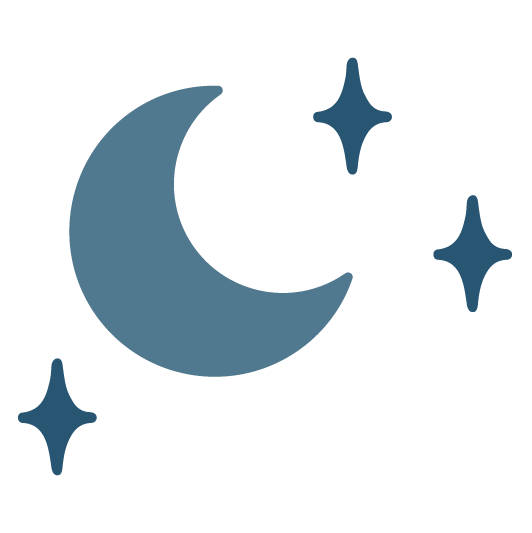Can poor sleep make you feel lonely?
In this article I explore the relationship between poor sleep, social isolation and loneliness, its potential causes, and give some pointers on how to improve the situation starting with sleep (naturally).
. . .
Lying awake in bed at night unable to fall asleep or waking up after only a few hours of sleep can be one of the loneliest of times (or places). Sharing the bed with a loved one doesn’t make it any better. On the contrary, we often feel even more alone because they can do something we can’t. What is natural and easy for them is seemingly impossible for us. Because we are different, we feel abnormal (at least that is what the mind wants us to believe). And with that the feeling of anxiety spikes yet again.
Worse still, the day after there’s this dreadful, zombie feeling of tiredness and a low mood. Our desire to socialise and engage with others is pretty much zero. We withdraw and isolate ourselves from others. A vicious circle forms.
Does what you have just read sound familiar? For many of my clients who experience insomnia this is their nightly (and often daily) experience. Research backs this up – poor sleep quality is a risk factor for loneliness and social isolation1. It works the other way too: loneliness and social isolation contribute to poor sleep and may even trigger it. Scientific findings corroborate personal accounts, i.e. those who feel lonely experience less restorative sleep2.
Loneliness and social isolation defined

But before I continue to explore what the underlying mechanisms might be, let me clarify what I mean by loneliness and social isolation.
Loneliness is a subjective feeling of being separate from others. You perceive yourself as being alone, regardless of any social connection you might have. Social isolation is related but different; here you have few or no social relations – i.e. you actually are by yourself. Most people also feel lonely when they are socially isolated, but some may not.
Why do we get into a vicious circle of poor sleep, loneliness and social isolation?
Humans are social creatures. From the day we are born we rely on others for our survival, physically and emotionally. Social interaction is a pillar of wellbeing for humans, so it follows that when we lack social connection and feel lonely, we run a higher-than-average risk of poor physical and mental health. We even face an increased mortality risk3. There is also robust evidence linking poor sleep with loneliness and social isolation. However, what the underlying mechanisms might be is not fully understood – yet. Let’s look at some of these theories next.
Why not sleeping well can lead to loneliness and social isolation
Sleep problems, poor sleep quality and high levels of sleepiness make us feel less motivated to socialise and we might start to withdraw from others. Because we feel more anxious, irritable, and aggressive after a short night, we feel unsafe and threatened. This can make it harder to connect with others. We engage less often in pro-social behaviour when we’ve slept poorly too. This matters because to feel connected we need to receive help and support from others, but we also need to be able to protect others. Interestingly, in a study from 20184 well-slept people judged sleep-deprived people as lonelier and kept their distance. Gradually, getting too little sleep can lead to loneliness and social isolation.
How about the other side, how can feelings of loneliness and social isolation affect sleep?
As I said before, we are social animals, we need other humans to survive. They also help regulate our own emotions, the touch of another (familiar) person can help calm us down. A good example is the relationship between a mother and her baby.
Feeling lonely, however, can make us feel unsafe and we become hypervigilant, constantly looking out for danger – day and night. Being in a hyper-alert state is the opposite of being calm and relaxed which is what we want in order to fall asleep. Indeed, research has shown that feeling lonely during the day leads to less restful sleep at night5.
Good social relationships have a positive influence on our behaviours, such as lifestyle choices, which in turn impact our health. Social ties can also provide a structure helping you stick to your health habits. Being socially isolated (that is, having little or no regular contact with meaningful others), however, is associated with less favourable lifestyles. Applying this thinking to sleep, social relationships can, for example, influence better adherence to regular sleep times and provide support or motivation to make sleep-friendly lifestyle choices (e.g. resist the temptation to spend another hour scrolling mindlessly through social media) when self-control is low (particularly at the end of a busy, demanding day) as shown in a recent study by Pilcher & Bryant6.
Finally, loneliness and social isolation can increase anxiety, stress and depression. Because each of these three can trigger poor sleep they provide an indirect route through which lack of social support can negatively affect sleep.
The vicious circle of poor sleep, loneliness and social isolation
From the above it seems likely that poor sleep (and sleepiness) contributes to feeling lonely and social isolation, and vice versa. Maybe it is even a tri-directional relationship, one that can trigger a vicious circle. And that brings me back to the the short case study I shared at the start: Insomnia -and the accompanying worrisome mind- contributes to feeling lonely at night, and daytime sleepiness decreases motivation to socialise. This can function as the first step to social isolation potentially causing you to feel lonelier. And feeling lonely in the day can lead to more alertness at night further disrupting sleep.
Move from a vicious circle to a virtuous circle of sleeping well, feeling good and social activity

You might expect me to say that the starting point to create a positive circle is sleep. And in a way that is true, I do agree that sleep is the single-most important health behaviour. But, I also know from my work with clients that a) no behaviour happens in isolation from other behaviours (I think the relationship between social isolation and poor health behaviours is a case in point) and b) there is no one-size-fits all approach. So while I might focus on the night with one client, I start with the day and taking meaningful action with another client. One thing is key to all my work – helping the client learn to step back from the constant stream of unpleasant thoughts and feelings, no matter when they show up, and then to choose what to do next.
If you want help with creating a virtuous circle of sleeping well, feeling good and social engagement, email me or book an initial call with me.
Warmly,
Dr Kat

References:
1Hom et al., 2017: Thwarted belongingness as an explanatory link between insomnia symptoms and suicidal ideation: Findings from three samples of military service members and veterans. Journal of Affective Disorders, 209, 114–123.
2 Hom et al., 2020: A Meta-Analysis of the Relationship Between Sleep Problems and Loneliness. Clinical Psychological Science, 8, 799-825.
3Cacioppo & Cacioppo, 2014: Social Relationships and Health: The Toxic Effects of Perceived Social Isolation. Soc Personal Psychol Compass., 8(2): 58–72.
4Ben Simon & Walker, 2018: Sleep loss causes social withdrawal and loneliness. Nat Commun 9, 3146.
5Cacioppo et al., 2002: Loneliness and Health: Potential Mechanisms. Psychosomatic Medicine, 64:407–417.
6Pilcher & Bryant, 2016: Implications of Social Support as a Self-Control Resource. Frontiers in Behavioral Neuroscience, 10:228.
